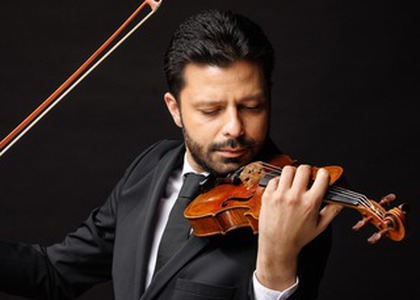> [Archived] Interviews

Interview with violonist Răzvan Stoica
Until the 2nd of July, the violinist Răzvan Stoica and his sister, pianist Andreea Stoica, will perform their third national tour dedicated to promoting baroque music. More details about the Baroque Tour op. 3 we learn from violinist Răzvan Stoica, in an interview with our colleague Ioana Țintea.
Răzvan Stoica, on the 25th of May you came back with a new edition of the Baroque Tour op.3. With what thoughts did you set off on tour again?
We started this tour with high hopes to reach the audience that consumes baroque music and the first concert in Timisoara on May 25th was a real success. We chose some special venues, such as the Sigismund Szana Cultural Palace, a place built around 1882, and the atmosphere was very natural, it really took us back to the baroque; and the acoustics were really baroque music, and we even played in a baroque tuning (so, one semitone lower).
What can you tell us about the selection of works for this edition of the Baroque Tour?
It is an edition dedicated to this titan composer Johann Sebastian Bach, with the well-known violin concertos in A minor, E major and the Double Concerto in D minor, this time in an instrumentation for piano and violin (the piano will play the first violin and the violin - the second violin), and two concertos by Antonio Vivaldi - the Concerto La stravaganza no.4 and the Concerto in D major, concertos less played, but which colour a bit the baroque repertoire of that period. And we have two more works that we play between these concerts, very well known, such as the Badineria from the Second Flute Suite, but this time played on violin.
Are there different elements from previous editions or have you kept the same concert format?
We kept the same format for the most part, except that in venues where we are allowed to have harpsichord we play a semitone lower. We wanted to keep the originality of the tuning and I think the sound changes immediately. And in this edition, we preferred to play on mallet strings, exactly as they were played in 1710-1720, especially as the instruments we play on allow this. And we also have in the band this year, our concertmaster, on behalf of the Stradivarius Foundation in Austria, has given us a violin of the same age as the Stradivarius that I play, an Amati violin. So the sound becomes more and more original, as I said before.
Considering previous Baroque Tour editions, how does the audience relate to Baroque music in general?
Great, as I can say! More and more consumers of baroque music are coming to our concerts. Although I am a violinist who usually adopts a romantic repertoire, my great love has always been baroque music - Johann Sebastian Bach, Antonio Vivaldi, Tartini of course. And I think in a way we relate very well and there's this energetic exchange in Baroque concerts, which are a practical living organism.
What is the biggest challenge in performing baroque music and how do you prepare for it?
The cleanliness of interpretation, without trying to bring them into that romantic area, to manage to stay in the original sound by the way we vibrate, by the way we nuance and phrase the sound. I'm very happy that this band I play with, Kamerata Stradivarius, and with Andreea, we have managed to adapt our sound so well that it comes very naturally. In rehearsals we really like it because we have the freedom to build naturally in the baroque style.
I would also like to hear about your project "A Stradivarius in Schools", which aims to bring young people closer to classical music in a familiar environment, right in their school. What has been the reaction of young music lovers so far?
The reactions were surprising in a very pleasant way. At the last concerts we had in Bucharest, at the "Sf. Sava" National College and at the "Gheorghe Lazăr" National College, the reactions were fantastic. The students fell in love with the music. In our concerts, by the way, some of these students have free entrance and are permanently invited to our tour concerts. Even in Bucharest, on the 11th of June, we will have 20-30 students invited to our concert and they will come because they have specifically asked to attend our concerts in the classical concert setting, not just in schools.
Here we are, after this season in schools, we will move on to the season in universities!
Tell us more about this new season!
It's a season that aims to bring students closer to classical music. We will start on the 5th of June at the National University "Alexandru Ioan Cuza" in Iași. We wanted to start in Iași, as it is a student city, and the oldest university in Romania. As I said, we start on the 5th of June and we will continue this season with at least eight universities nationwide. Timișoara will follow and then, of course, Bucharest.
Translated by Miruna-Gabriela Flipache,
University of Bucharest, Faculty of Foreign Languages and Literatures, MTTLC, year I
Corrected by Silvia Petrescu














